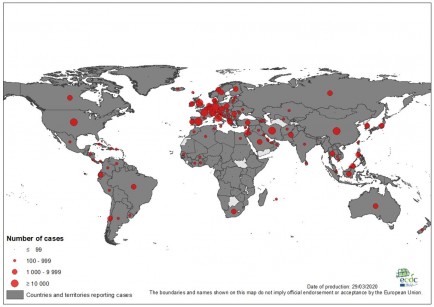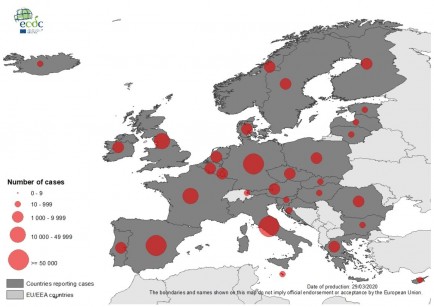Thirty-three people have now died due to vaping-related illness in the U.S. Tennessee and Montana reported their first deaths and Minnesota and Indiana each reported two additional deaths. In Minnesota, state health officials said both deaths were in adults over 50, and one vaped illegal THC. The second had “severe underlying conditions” and had vaped nicotine and other unknown products. In Montana, a person in their late teens with a history of vaping died. Tennessee and Indiana did not provide any additional information on their deaths.
Other recent vaping-related deaths include:
- A person under the age of 30 in Utah who died at home and had vaped THC.
- In New York, a 17-year-old male from the Bronx.
- A woman in her 60s from Massachusetts.
- A person Georgia who had a history of nicotine vaping — the state’s second death.
Cases of vaping-related lung illness in the U.S. have climbed to 1,479 as of Oct. 17, up from 1,299 the week before, the CDC said.
The CDC has said its investigation suggests, “THC products play a role in the outbreak.” The agency said 78% of the people reported using products containing THC, the ingredient in marijuana that makes users high. Still, agency officials said more information is needed. The ongoing investigation “may take a few months” and there likely will be “multiple causes and possibly more than one root cause,” Anne Schuchat, MD, principal deputy director at the US Centers for Disease Control and Prevention, said during a briefing with reporters on Friday.
On Sept. 30, Texas chain H-E-B said it had immediately discontinued sales of e-cigarettes. Walmart, the world’s largest retailer, said it would stop selling all e-cigarettes once existing inventory runs out, CNBC reported this month.
“Given the growing federal, state and local regulatory complexity and uncertainty regarding e-cigarettes, we plan to discontinue the sale of electronic nicotine delivery products at all Walmart and Sam’s Club U.S. locations,” the company said in a memo to local managers. “We will complete our exit after selling through current inventory.”
The 1,479 confirmed cases are from 49 states,the District of Columbia and one territory. The 33 deaths are from 24 states. The patients who died range in age from 17 to 75 years old, the CDC said, with the median age 44 years.
“No consistent e-cigarette product, additive, or brand has been identified in all cases,” she said.
The update comes as new data reveal the rate of vaping nicotine among teens has doubled in the past 2 years. According to the 2019 Monitoring the Future Survey, 25% of 12th graders, 20% of 10th graders, and 9% of eighth graders reported vaping nicotine in the past month.
For its investigation, the FDA has collected more than 150 vaping product samples, according to Mitch Zeller, JD, director of the FDA Center for Tobacco Products. The agency is analyzing the samples for a broad range of substances, including THC and other cannabinoids, opioids, cutting agents, pesticides, and other toxins. The FDA’s enforcement arm — the Office of Criminal Investigations — has begun a parallel investigation, Zeller said. It will focus on the supply chain and figuring out what is making people sick.
He didn’t know when federal officials might determine which product or products are to blame.
“Identifying any product in the samples is just one piece of the puzzle,” he said.
Emerging Profile
Based on data on the cases so far, nearly three-quarters of the cases are male and more than half are under 25 years of age, Anne Schuchat, MD, principal deputy director of the CDC, said. Patients typically report coughing, shortness of breath, chest pain, nausea, vomiting, diarrhea, fever, and belly pain.
“Some have reported the use of e-cigarettes using only nicotine.” Others report using THC, or a combination, she said.
Patients may have been exposed to a variety of products, and some have been too ill to share information for the investigation, she said. A growing number of media companies are shunning vaping advertisements. Following the lead of CNN, which announced it will no longer run ads for vaping products, CBS, WarnerMedia, and Viacom are also pulling the plug on e-cigarette advertising.
At least one state — Massachusetts — has banned the sale of all e-cigarettes for 4 months. On Oct. 15, a judge in Michigan temporarily blocked that state’s ban on flavored e-cigarettes, saying it may force adults to return to smoking tobacco products and has harmed vaping businesses. New York, Rhode Island and Washington state have all implemented temporary bans on the sale flavored e-cigarettes, while Utah has banned flavored vapes except in adult-only tobacco shops, according to Tobacco Free Kids. The Trump administration has also asked the FDA to ban the sale of non-tobacco-flavored e-cigarettes.
Meanwhile, the CEO of Juul Labs, the largest vaping product maker in the United States, announced he was stepping down and the company said it would stop all advertising. Kroger and Walgreens have also stopped sales of e-cigarettes. Federal officials again pleaded for people to stop vaping until they know more about what is triggering the lung injuries. Anyone with information is urged to report it to the online safety reporting portal for the FDA and National Institutes of Health, Zeller said, at www.safetyreporting.hhs.gov.
Original article: https://www.webmd.com/mental-health/addiction/news/20190919/530-sick-7-dead-from-mysterious-vaping-illnesses




























Comments